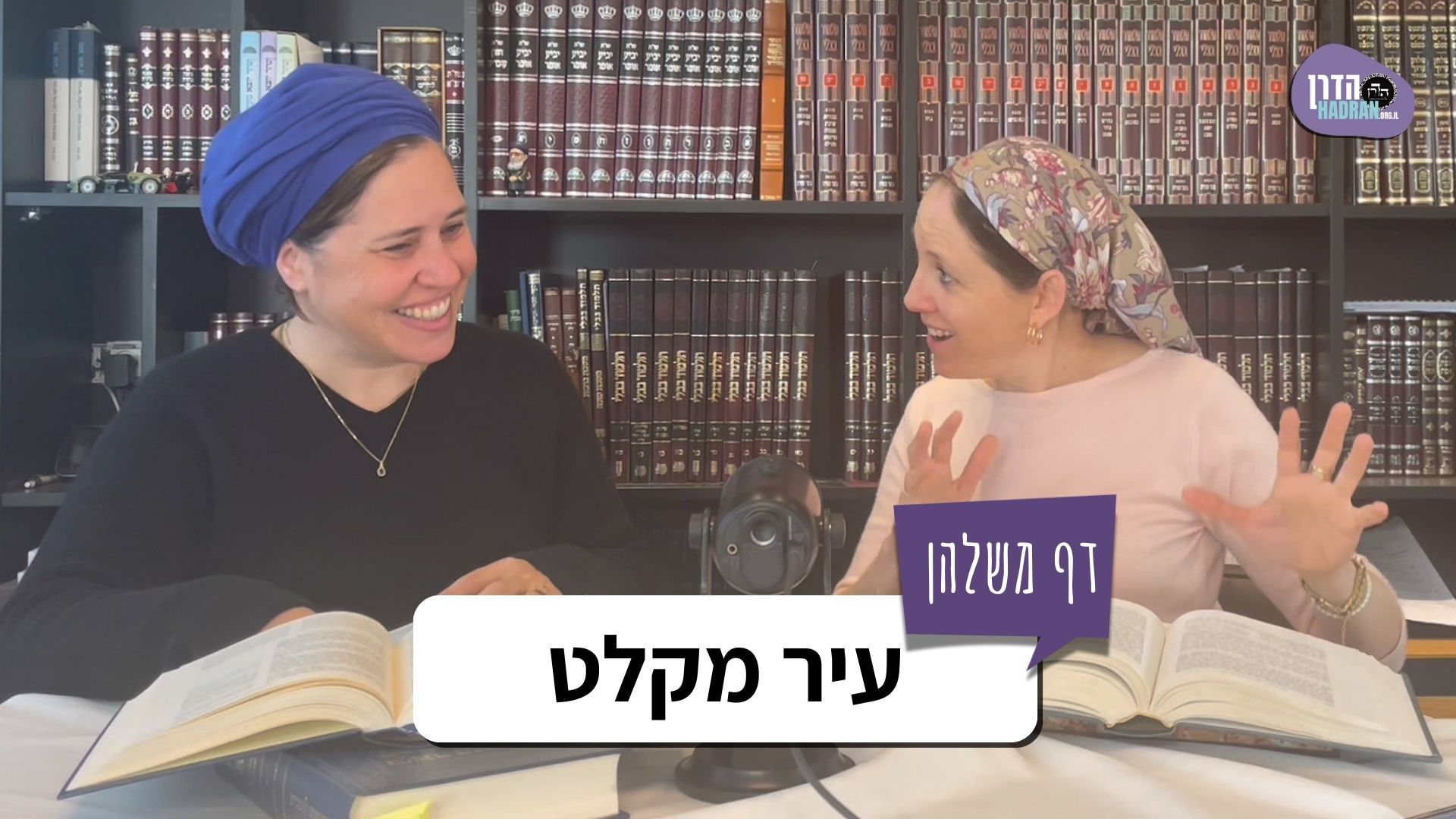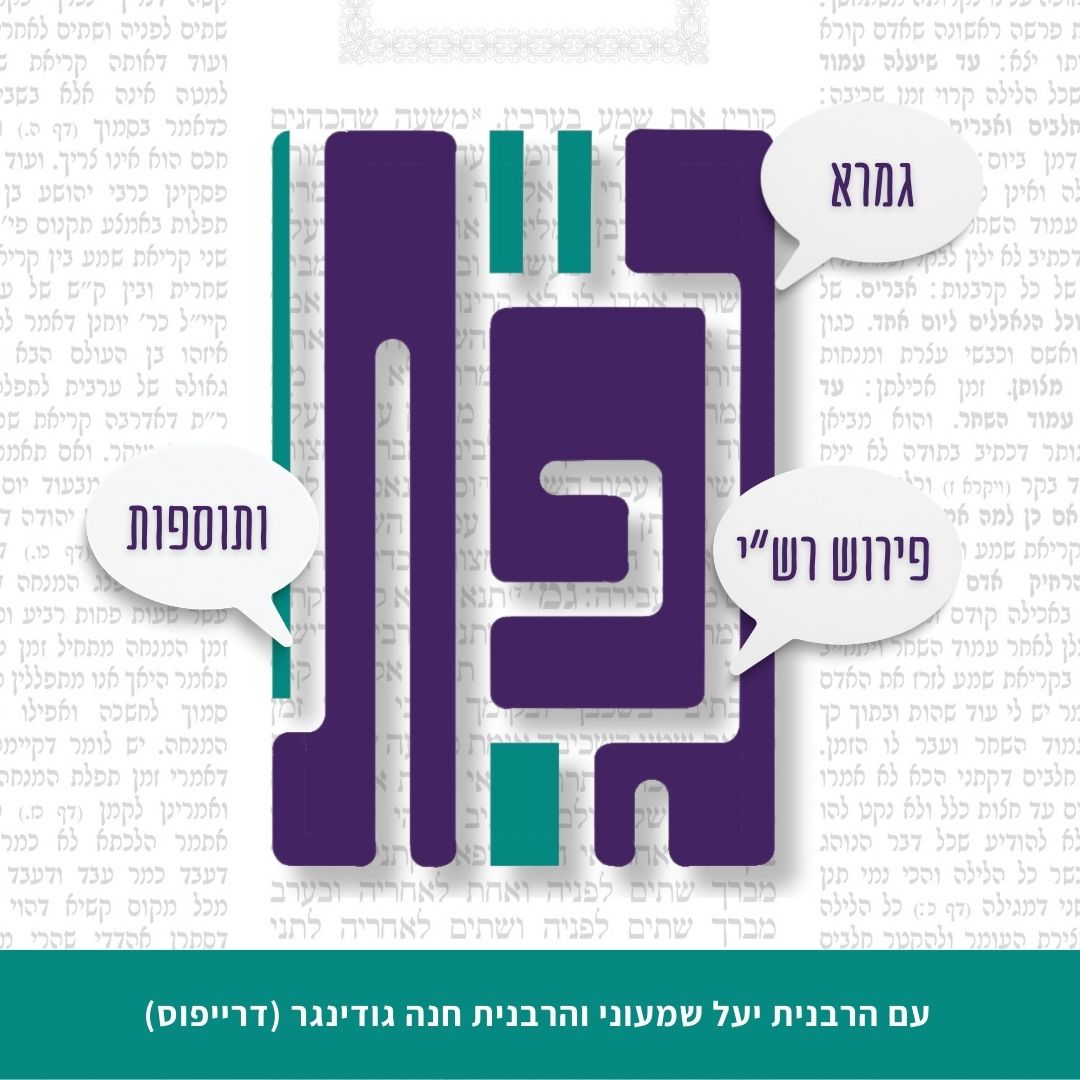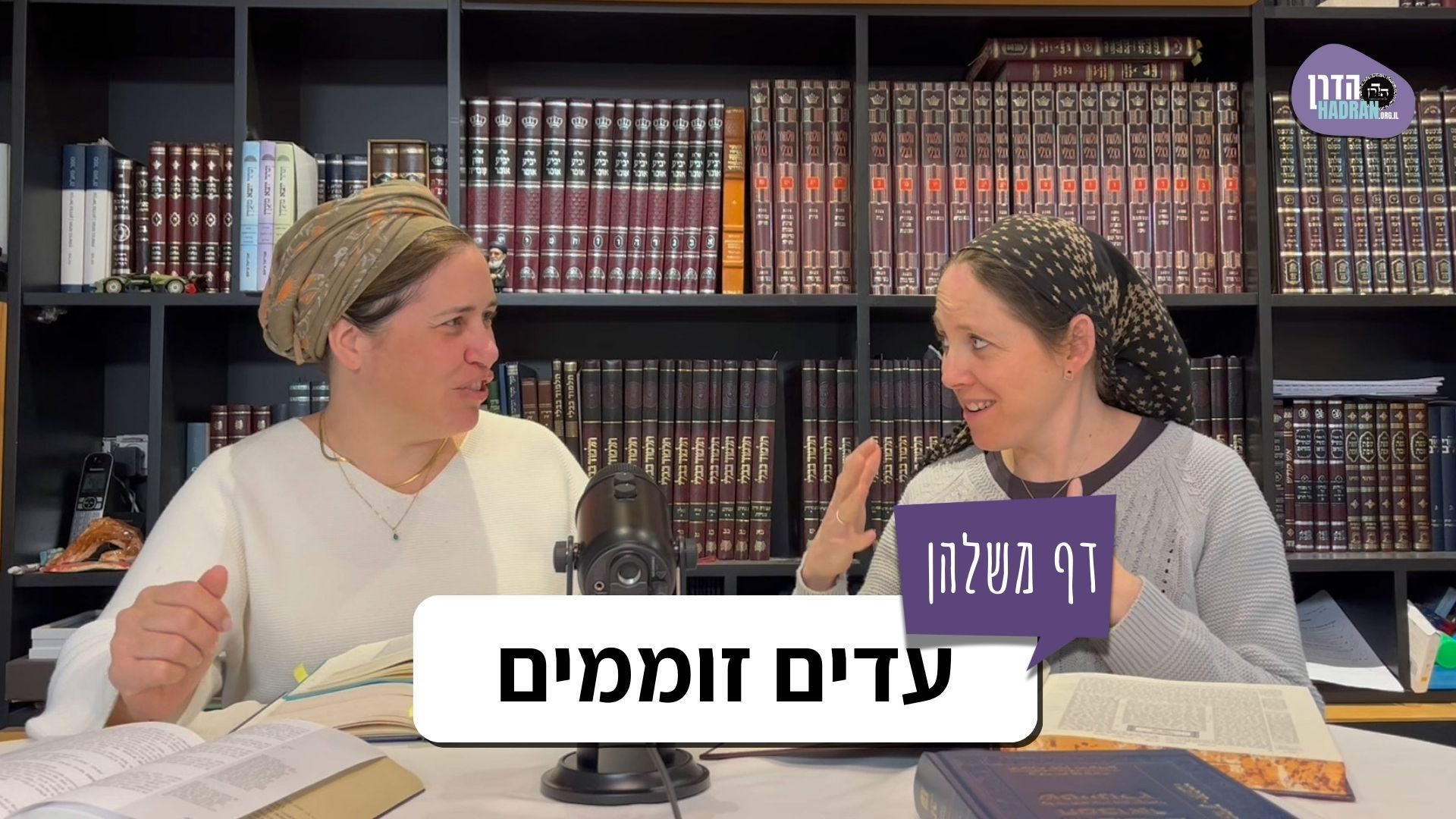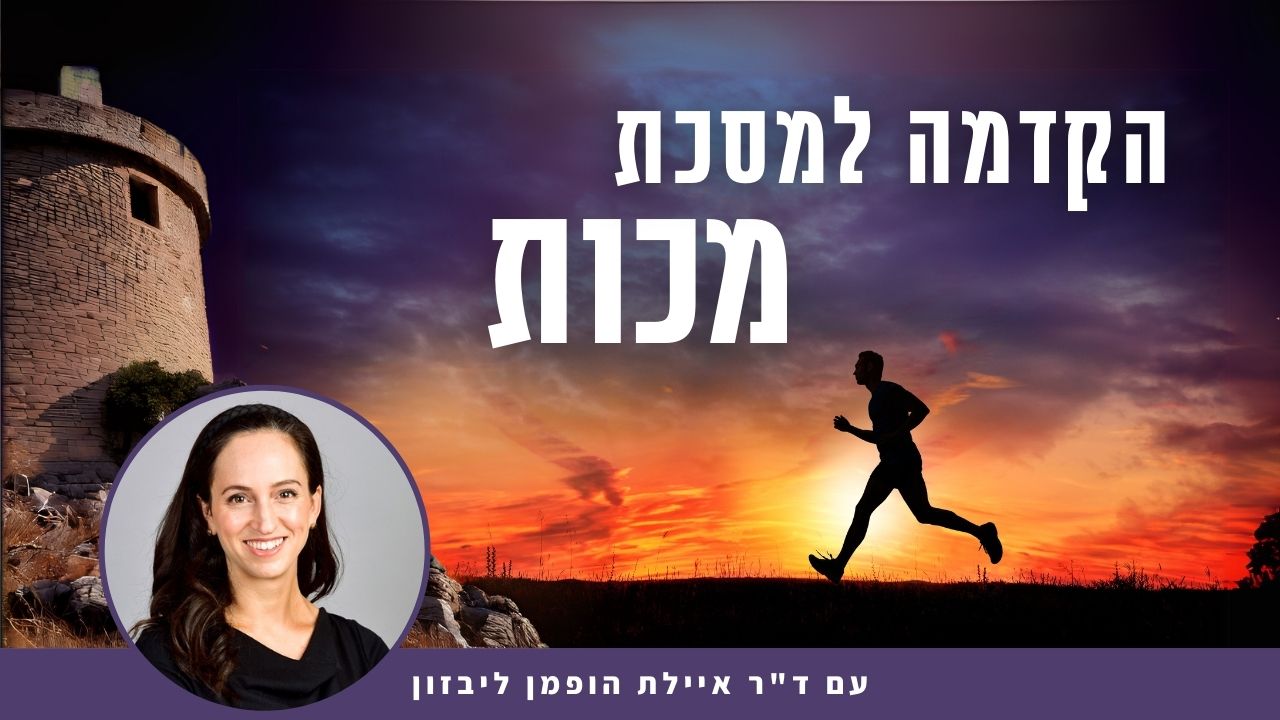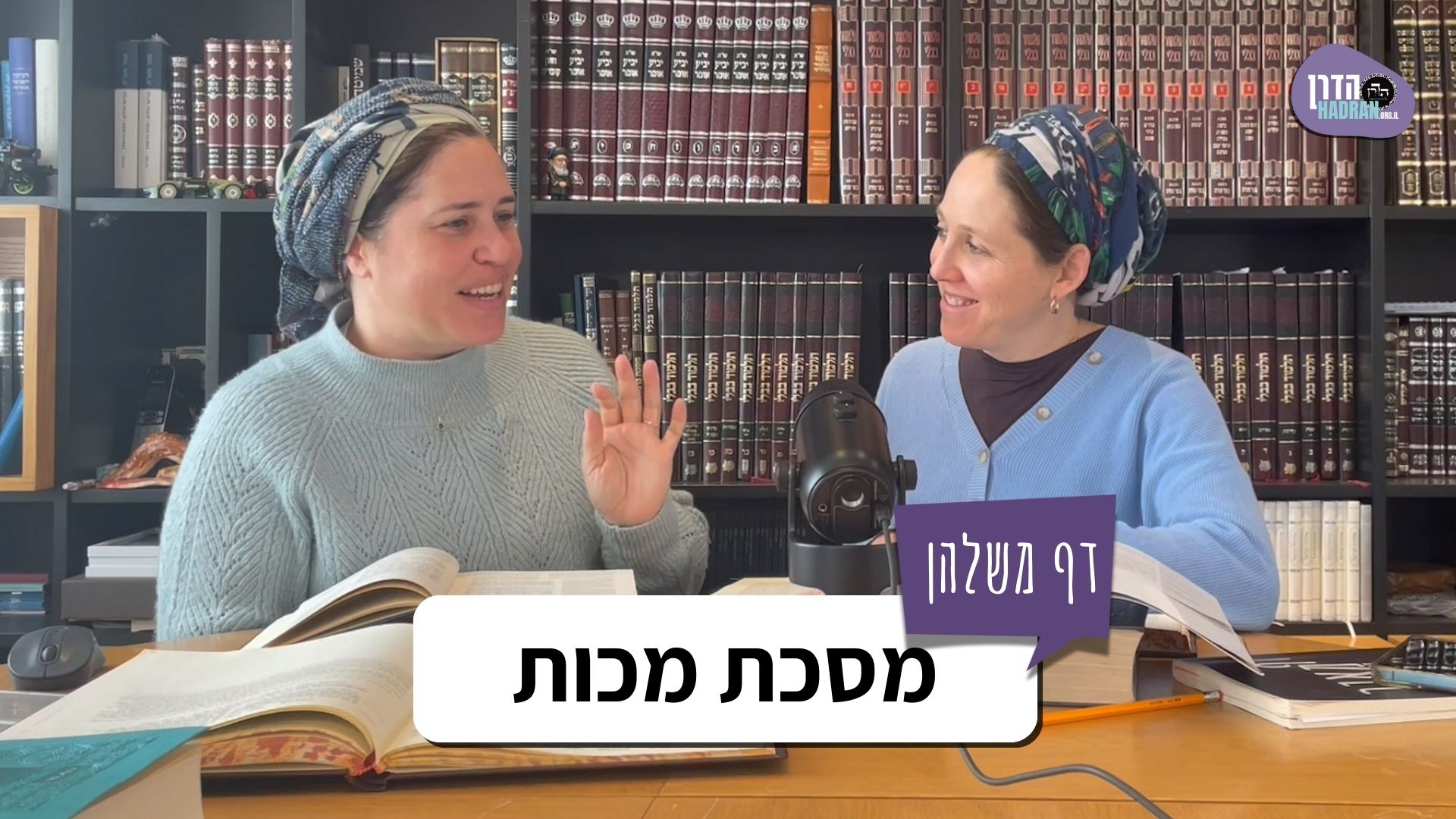מכות כב
מִשּׁוּם הַבְעָרָה. וְאִם אִיתָא, מִשּׁוּם הַבְעָרָה לָא מִחַיַּיב, דְּהָא אִיחַיַּיב לֵיהּ מִשּׁוּם בִּשּׁוּלוֹ! אַפֵּיק הַבְעָרָה וְעַיֵּיל גִּיד הַנָּשֶׁה שֶׁל נְבֵילָה.
for violating the prohibition of kindling a fire on a Festival. And if it is so, that there is no division of labors on a Festival, he is not liable for violating the prohibition of kindling a fire, as he is already liable for violating the prohibition of cooking the sciatic nerve on a Festival. Rava said: Remove kindling from the list of five prohibitions for which he is flogged, as he is not liable for violating that prohibition, and insert the prohibition of eating the sciatic nerve of an unslaughtered animal carcass.
וְהָתָנֵי רַבִּי חִיָּיא: לוֹקֶה שְׁתַּיִם עַל אֲכִילָתוֹ וְשָׁלֹשׁ עַל בִּשּׁוּלוֹ. וְאִי אִיתָא, שָׁלֹשׁ עַל אֲכִילָתוֹ הוּא חַיָּיב! אֶלָּא: אַפֵּיק הַבְעָרָה וְעַיֵּיל עֲצֵי אֲשֵׁירָה, וְאַזְהָרְתֵּיהּ מֵהָכָא: ״וְלֹא יִדְבַּק בְּיָדְךָ וְגוֹ׳״.
The Gemara asks: But didn’t Rabbi Ḥiyya teach a baraita that summarizes the prohibitions listed in this mishna: One is flogged with two sets of lashes for his eating and three sets of lashes for his cooking? And if it is so, that the prohibition of kindling a fire is replaced with the prohibition of eating the sciatic nerve of an unslaughtered animal carcass, he is liable to receive three sets of lashes for his eating; for eating a sciatic nerve, for eating meat cooked in milk, and for eating an unslaughtered animal carcass. Rather, say: Remove kindling from the list of prohibitions, and insert the prohibition of using wood of a tree worshipped as part of idolatrous rites [ashera], whose prohibition is derived from here: “And nothing of the dedicated item shall cleave to your hand” (Deuteronomy 13:18), indicating that it is forbidden to derive benefit from accoutrements of idol worship.
אֲמַר לֵיהּ רַב אַחָא בְּרֵיהּ דְּרָבָא לְרַב אָשֵׁי: וְלִילְקֵי נָמֵי מִשּׁוּם ״לֹא תָבִיא תוֹעֵבָה אֶל בֵּיתֶךָ״! אֶלָּא: הָכָא בְּמַאי עָסְקִינַן – כְּגוֹן שֶׁבִּישְּׁלוֹ בַּעֲצֵי הֶקְדֵּשׁ, וְאַזְהַרְתֵּיהּ מֵהָכָא: ״וַאֲשֵׁרֵיהֶם תִּשְׂרְפוּן בָּאֵשׁ… לֹא תַעֲשׂוּן כֵּן לַה׳ אֱלֹהֵיכֶם״.
Rav Aḥa, son of Rava, said to Rav Ashi: If the reference is to the wood of an ashera, let him also be flogged for violating the prohibition: “You shall not bring an abomination into your house” (Deuteronomy 7:26), in addition to the other prohibitions enumerated. Rather, say: What are we dealing with here? We are dealing with a case where one cooked the sciatic nerve with wood consecrated for use in the Temple, whose warning, the source of its prohibition, is from here: “And their asherim you shall burn in fire…you shall not do so to the Lord your God” (Deuteronomy 12:3–4), indicating that one who destroys a consecrated item violates a prohibition.
סִימָן. שנבא״י שנ״ז
§ The Gemara provides a mnemonic: Shin, nun, beit, alef, yod; shin, nun, zayin; representing the amora’im who suggest additions to the eight prohibitions violated by the person in the mishna who plows the field with diverse kinds: Hoshaya; Ḥananya; Abbahu; Abaye; Ashi; Ravina; Zeira.
מַתְקֵיף לַהּ רַב הוֹשַׁעְיָא: וְלִיחְשׁוֹב נָמֵי הַזּוֹרֵעַ בְּנַחַל אֵיתָן, וְאַזְהָרְתֵּיהּ מֵהָכָא: ״אֲשֶׁר לֹא יֵעָבֵד בּוֹ וְלֹא יִזָּרֵעַ״!
Rav Hoshaya objects to this: And let the tanna also enumerate in his list the prohibition of sowing in a forceful stream, the land where a heifer’s neck is broken by the Elders of the city closest to the corpse of a murder victim whose murderer is unknown, and its prohibition is from here: “And the Elders of that city shall bring the heifer down to a forceful stream, which will be neither plowed nor sown” (Deuteronomy 21:4). The verse is written in the future tense as a prohibition for the future: It is prohibited to work the land there after the heifer’s neck is broken.
מַתְקֵיף לַהּ רַב חֲנַנְיָא: וְלִיחְשׁוֹב נָמֵי הַמּוֹחֵק אֶת הַשֵּׁם בַּהֲלִיכָתוֹ, וְאַזְהָרְתֵּיהּ מֵהָכָא: ״וְאִבַּדְתֶּם אֶת שְׁמָם וְגוֹ׳ (וְ)לֹא תַעֲשׂוּן כֵּן לַה׳ אֱלֹהֵיכֶם״!
Rav Ḥananya objects to this: And let the tanna also enumerate one who erases the name of God in the course of his walking and plowing, and its prohibition is from here: “And you shall destroy their names…you shall not do so to the Lord your God” (Deuteronomy 12:3–4).
מַתְקֵיף לַהּ רַבִּי אֲבָהוּ: וְלִיחְשׁוֹב נָמֵי הַקּוֹצֵץ אֶת בַּהַרְתּוֹ, וְאַזְהָרְתֵּיהּ מֵהָכָא: ״הִשָּׁמֶר בְּנֶגַע הַצָּרַעַת״!
Rabbi Abbahu objects to this: And let the tanna also enumerate one who severs his snow-white leprous mark in the course of his plowing, and its prohibition is from here: “Take heed of the plague of leprosy” (Deuteronomy 24:8), indicating the prohibition against severing the mark.
מַתְקֵיף לַהּ אַבָּיֵי: וְלִיחְשׁוֹב נָמֵי הַמֵּזִיחַ הַחוֹשֶׁן מֵעַל הָאֵפוֹד, וְהַמֵּסִיר בַּדֵּי אָרוֹן, וְאַזְהָרְתֵּיהּ מֵהָכָא: ״(וְ)לֹא יָסֻרוּ״, ״וְלֹא יִזַּח הַחֹשֶׁן״!
Abaye objects to this: And let the tanna also enumerate one who loosens the breastplate from upon the ephod in the course of plowing, or one who removes the staves of the Ark of the Covenant. And its prohibition is from here: “The staves shall be in the rings of the Ark; they shall not be removed from it” (Exodus 25:15), while the relevant verse with regard to the breastplate is: “And the breastplate shall not be loosened from the ephod” (Exodus 28:28).
מַתְקֵיף לַהּ רַב אָשֵׁי: וְלִיחְשׁוֹב נָמֵי הַחוֹרֵשׁ בַּעֲצֵי אֲשֵׁירָה, וְאַזְהָרְתֵּיהּ מֵהָכָא: ״וְלֹא יִדְבַּק בְּיָדְךָ מְאוּמָה וְגוֹ״!
Rav Ashi objects to this: And let the tanna also enumerate one who plows with a plow crafted from the wood of an ashera, and its prohibition is from here: “And there shall cleave nothing of the dedicated item to your hand” (Deuteronomy 13:18).
מַתְקֵיף לַהּ רָבִינָא: וְלִיחְשׁוֹב נָמֵי הַקּוֹצֵץ אִילָנוֹת טוֹבוֹת, וְאַזְהָרְתֵּיהּ מֵהָכָא: ״כִּי מִמֶּנּוּ תֹאכֵל וְאֹתוֹ לֹא תִכְרֹת״!
Ravina objects to this: And let the tanna also enumerate one who chops down beautiful fruit trees in the course of plowing, and its prohibition is from here: “For you may eat of it, and you shall not chop it down” (Deuteronomy 20:19).
אֲמַר לֵיהּ רַבִּי זְעֵירָא לְרַבִּי מָנִי: וְלִיחְשׁוֹב נָמֵי כְּגוֹן דְּאָמַר ״שְׁבוּעָה שֶׁלֹּא אֶחְרוֹשׁ בְּיוֹם טוֹב״! הָתָם לָא קָא חָלָה שְׁבוּעָה, מוּשְׁבָּע וְעוֹמֵד מֵהַר סִינַי הוּא. אֲמַר לֵיהּ: כְּגוֹן דְּאָמַר ״שְׁבוּעָה שֶׁלֹּא אֶחְרוֹשׁ בֵּין בַּחוֹל בֵּין בְּיוֹם טוֹב״, דְּמִגּוֹ דְּחָלָה עֲלֵיהּ שְׁבוּעָה בְּחוֹל – חָלָה עֲלֵיהּ נָמֵי בְּיוֹם טוֹב! מִידֵּי דְּאִיתֵיהּ בִּשְׁאֵילָה לָא קָתָנֵי.
Rabbi Zeira said to Rabbi Mani: And let the tanna also enumerate a case where one says: On my oath I will not plow on the Festival, and then proceeds to violate his oath. Rabbi Mani said: There, the oath does not take effect, as he is already under oath from Mount Sinai not to plow on a Festival, and an oath does not take effect when another oath is already in effect. Rabbi Zeira said to him: The oath can take effect in a case where one says: On my oath I will not plow whether during the week or on a Festival, as in that case, since the oath takes effect in his regard during the week, it takes effect in his regard on a Festival as well. Rabbi Mani replied: The mishna did not include that prohibition because the tanna is not teaching a matter that is in the category of those matters subject to dissolution by means of posing a request to a Torah scholar. As oaths fall into that category, this case is not enumerated in the mishna.
וְלָא? וַהֲרֵי הֶקְדֵּשׁ! בִּבְכוֹר. וַהֲרֵי נָזִיר! בִּנְזִיר שִׁמְשׁוֹן.
Rabbi Zeira asked: And did the tanna not teach matters subject to dissolution by means of a Torah scholar? But isn’t there the matter of consecrated animals, whose sanctity can be repealed by means of dissolution of the vow by a Torah scholar, which was included in the mishna? Rabbi Mani answered: The tanna is referring to a firstborn animal, which is consecrated from the womb. Since it was not consecrated by means of a vow, the sanctity cannot be dissolved by a Torah scholar. Rabbi Zeira asked: But isn’t there the matter of the impurity of a nazirite, whose vow of naziriteship can be dissolved by a Torah scholar, which was included in the mishna? Rabbi Mani answered: The reference in the mishna is to one who is a nazirite like Samson, for whom there is no dissolution.
נְזִיר שִׁמְשׁוֹן בַּר אִיטַּמּוֹיֵי לְמֵתִים הוּא? אֶלָּא, הַאי תַּנָּא אִיסּוּר כּוֹלֵל לֵית לֵיהּ.
Rabbi Zeira asked: Is a nazirite like Samson subject to the prohibition of contracting impurity imparted by corpses? He is not. As the tanna enumerated the prohibition of a nazirite becoming impure with impurity imparted by a corpse, clearly he is not a nazirite like Samson. Rather, the tanna does not enumerate the case of one who violated an oath not to plow both during the week and on a Festival, because this tanna is not of the opinion that a more inclusive prohibition takes effect when the standard prohibition does not take effect. Just as with regard to one who takes an oath not to perform labor on a Festival, the oath does not take effect, so too, even if he adds to it an oath not to plow during the week, it does not take effect, because he is already under oath from Sinai not to plow on a Festival.
אָמַר רַבִּי הוֹשַׁעְיָא: הַמַּרְבִּיעַ שׁוֹר פְּסוּלֵי הַמּוּקְדָּשִׁים – לוֹקֶה שְׁנַיִם. אָמַר רַבִּי יִצְחָק: הַמַּנְהִיג בְּשׁוֹר פְּסוּלֵי הַמּוּקְדָּשִׁים – לוֹקֶה, שֶׁהֲרֵי גּוּף אֶחָד הוּא, וַעֲשָׂאוֹ הַכָּתוּב כִּשְׁנֵי גּוּפִים.
Rabbi Hoshaya says: One who breeds a disqualified consecrated ox with a female even of the same species is flogged with two sets of lashes, one for labor with a disqualified consecrated animal, and one for breeding two animals of diverse kinds. Even after the animal is desacralized through redemption, it remains prohibited to perform labor with it. It is considered diverse kinds because the Torah accorded disqualified consecrated animals the status of two animals, one consecrated and one non-sacred. If one breeds such an animal with an ox, it is as though he bred it with an animal of a different species, thereby violating the prohibition. Likewise, Rabbi Yitzḥak says: One who drives a disqualified consecrated ox to plow the field is flogged, as it is one body, and the verse accorded it the status of two bodies. One who plows with two different species of animals together is liable to receive lashes.
מַתְנִי׳ כַּמָּה מַלְקִין אוֹתוֹ – אַרְבָּעִים חָסֵר אַחַת, שֶׁנֶּאֱמַר ״בְּמִסְפַּר אַרְבָּעִים״ – מִנְיָן שֶׁהוּא סָמוּךְ לְאַרְבָּעִים. רַבִּי יְהוּדָה אוֹמֵר: אַרְבָּעִים שְׁלֵימוֹת הוּא לוֹקֶה, וְהֵיכָן הוּא לוֹקֶה אֶת הַיְּתֵירָה – בֵּין כְּתֵפָיו.
MISHNA: With how many lashes does one flog a person sentenced to receive lashes? One flogs him with forty lashes less one, as it is stated: “And he shall strike him before him, in accordance with his wickedness, by number. Forty he shall strike him, he shall not add” (Deuteronomy 25:2–3). The mishna joins the end of the first verse and the beginning of the second, forming the phrase: “By number, forty,” which is interpreted as: A sum adjacent to forty. Rabbi Yehuda says: He is flogged with a full forty lashes. And where is he flogged the extra lash? As the mishna proceeds to explain, the thirty-nine lashes are divided into three and administered in three places on the body of the person being flogged; according to Rabbi Yehuda there is one lash that remains. That lash is administered between his shoulders.
אֵין אוֹמְדִין אוֹתוֹ, אֶלָּא בְּמַכּוֹת רְאוּיוֹת לְהִשְׁתַּלֵּשׁ. אֲמָדוּהוּ לְקַבֵּל אַרְבָּעִים, וְלוֹקֶה מִקְצָת,
One assesses the number of lashes that the one being punished is capable of withstanding only with a number of lashes fit to be divided into three equal groups. If the assessment was that he can survive twenty lashes, he is flogged with eighteen. Likewise, if doctors assessed concerning him that he is able to receive forty lashes and survive, and he is then flogged some of those forty lashes,
וְאָמְדוּ שֶׁאֵין יָכוֹל לְקַבֵּל אַרְבָּעִים – פָּטוּר. אֲמָדוּהוּ לְקַבֵּל שְׁמוֹנֶה עֶשְׂרֵה, וּמִשֶּׁלָּקָה אָמְדוּ שֶׁיָּכוֹל הוּא לְקַבֵּל אַרְבָּעִים – פָּטוּר.
and then they assessed him again and concluded that he cannot receive forty lashes and survive, he is exempt from the additional lashes. If the doctors initially assessed concerning him that he is able to receive only eighteen lashes, and once he was flogged eighteen times they assessed that he is able to receive forty, he is exempt from receiving additional lashes.
גְּמָ׳ מַאי טַעְמָא? אִי כְּתִיב ״אַרְבָּעִים בְּמִסְפָּר״ הֲוָה אָמֵינָא: אַרְבָּעִים בְּמִנְיָינָא, הַשְׁתָּא דִּכְתִיב ״בְּמִסְפַּר אַרְבָּעִים״ – מִנְיָן שֶׁהוּא סוֹכֵם אֶת הָאַרְבָּעִים. אָמַר רָבָא: כַּמָּה טַפְשָׁאֵי שְׁאָר אִינָשֵׁי, דְּקָיְימִי מִקַּמֵּי סֵפֶר תּוֹרָה, וְלָא קָיְימִי מִקַּמֵּי גַּבְרָא רַבָּה, דְּאִילּוּ בְּסֵפֶר תּוֹרָה כְּתִיב ״אַרְבָּעִים״, וַאֲתוֹ רַבָּנַן בְּצַרוּ חֲדָא.
GEMARA: The Gemara begins with a discussion of the number of lashes. What is the reason that the Rabbis said that he receives forty lashes less one? If it had been written: Forty by number, I would say that it means forty as a precise sum; now that it is written: “By number, forty,” the reference is to a sum that approaches forty. Likewise, Rava said: How foolish are the rest of the people who stand before a Torah scroll that passes before them, and yet they do not stand before a great man, when a Sage passes before them; as in a Torah scroll, forty is written and the Sages came and subtracted one, establishing the number of lashes as thirty-nine. Apparently, the authority of the Sages is so great that they are able to amend an explicit Torah verse.
רַבִּי יְהוּדָה אוֹמֵר: אַרְבָּעִים שְׁלֵימוֹת וְכוּ׳. אָמַר רַבִּי יִצְחָק: מַאי טַעְמָא דְּרַבִּי יְהוּדָה – דִּכְתִיב ״מָה הַמַּכּוֹת הָאֵלֶּה בֵּין יָדֶיךָ וְאָמַר אֲשֶׁר הֻכֵּתִי בֵּית מְאַהֲבָי״. וְרַבָּנַן? הַהוּא בְּתִינוֹקוֹת שֶׁל בֵּית רַבָּן הוּא דִּכְתִיב.
The mishna teaches: Rabbi Yehuda says: He is flogged with a full forty lashes, with the additional lash administered between his shoulders. Rabbi Yitzḥak says: What is the reason for the opinion of Rabbi Yehuda? It is as it is written: “And one shall say to him: What are these wounds between your arms? Then he shall answer: Those with which I was wounded in the house of my friends” (Zechariah 13:6). Rabbi Yehuda understands that this verse is referring to one with wounds from lashes administered between his arms, indicating that there is one lash administered between the shoulders. And how do the Rabbis, who hold that one is flogged only thirty-nine lashes, explain this verse? They explain that this verse is written with regard to schoolchildren struck by their teacher for laxity in their studies, and is not referring to lashes administered by the court.
אֵין אוֹמְדִין אֶלָּא בְּמַכּוֹת הָרְאוּיוֹת וְכוּ׳. לָקָה – אִין, לֹא לָקָה – לָא.
The mishna teaches: One assesses the number of lashes that the one being punished is capable of withstanding only with a number of lashes fit to be divided into three equal groups. If doctors assessed concerning him that he is able to receive forty lashes and survive, and he is then flogged some of those forty lashes, and they then assessed him again and concluded that he cannot receive forty lashes and survive, he is exempt from any additional lashes. If the doctors initially assessed concerning him that he is able to receive only eighteen lashes, and once he was flogged with eighteen lashes they assessed that he is able to receive forty, he is exempt from receiving further lashes. The Gemara infers: If he was flogged in practice, yes, he is exempt; if he was not flogged, no, he is not exempt from the rest of the forty lashes.
וּרְמִינְהוּ: אֲמָדוּהוּ לְקַבֵּל אַרְבָּעִים, וְחָזְרוּ וְאָמְדוּ שֶׁאֵין יָכוֹל לְקַבֵּל אַרְבָּעִים – פָּטוּר. אֲמָדוּהוּ לְקַבֵּל שְׁמוֹנֶה עֶשְׂרֵה, וְחָזְרוּ וַאֲמָדוּהוּ שֶׁיָּכוֹל לְקַבֵּל אַרְבָּעִים – פָּטוּר.
And the Gemara raises a contradiction from a baraita: If doctors assessed concerning him that he is able to receive forty lashes and survive, and they then assessed him again and concluded that he cannot receive forty lashes and survive, he is exempt. If the doctors initially assessed concerning him that he is able to receive only eighteen lashes, and they then assessed that he is able to receive forty, he is exempt. Apparently, even if he did not receive any lashes, if the assessment changes, it is as though he was flogged.
אָמַר רַב שֵׁשֶׁת: לָא קַשְׁיָא, הָא – דַּאֲמָדוּהוּ לְיוֹמֵי, הָא – דַּאֲמָדוּהוּ לִמְחַר וּלְיוֹמָא אוּחְרָא.
Rav Sheshet said: This is not difficult, as this case in the mishna is one where doctors assessed his fitness to receive lashes for that day, and there was no change in his condition; rather, it was discovered that the initial assessment was mistaken. He is exempt only if he was already flogged; if not, another assessment is performed. That case in the baraita is one where doctors assess his fitness to receive lashes for the next day or for a different day. In that case, the initial assessment was accurate; it is his condition that changed. Therefore, if it is determined that he is unable to receive lashes, he is exempt.
מַתְנִי׳ עָבַר עֲבֵירָה שֶׁיֵּשׁ בָּהּ שְׁנֵי לָאוִין, אֲמָדוּהוּ אוֹמֶד אֶחָד – לוֹקֶה וּפָטוּר, וְאִם לָאו – לוֹקֶה וּמִתְרַפֵּא, וְחוֹזֵר וְלוֹקֶה.
MISHNA: If one performed a transgression that involves two prohibitions, and they assessed concerning him a single assessment of the number of lashes that he could withstand in punishment for both transgressions, he is flogged in accordance with their assessment and is exempt from any additional lashes. And if not, if he was assessed with regard to the lashes that he could withstand for one transgression, he is flogged and is allowed to heal, and then is flogged again for violating the second prohibition.
גְּמָ׳ וְהָתַנְיָא: אֵין אוֹמְדִין אוֹמֶד אֶחָד לִשְׁנֵי לָאוִין!
GEMARA: The case in the mishna is one where there is one assessment performed for two sets of lashes. The Gemara asks: But isn’t it taught in a baraita: One does not perform one assessment for two prohibitions?
אָמַר רַב שֵׁשֶׁת: לָא קַשְׁיָא, הָא – דַּאֲמָדוּהוּ לְאַרְבָּעִים וַחֲדָא. הָא – דַּאֲמָדוּהוּ לְאַרְבָּעִים וְתַרְתֵּי.
Rav Sheshet said: This is not difficult; this ruling in the baraita that one does not perform a single assessment for two prohibitions is in a case where doctors assessed concerning him that he is able to receive forty-one lashes, two lashes beyond a full set. Since those two additional lashes are not divisible by three, which is a requirement based on the previous mishna, he receives only thirty-nine lashes. That constitutes just one set of lashes. He remains liable to receive another set of lashes after he recovers, requiring another assessment and another set of lashes. That ruling in the mishna that one performs a single assessment for two prohibitions is in a case where doctors assessed concerning him that he is able to receive forty-two lashes. In that case, it is possible to ascribe thirty-nine lashes to one prohibition and three additional lashes to the second prohibition. That is tantamount to two separate assessments, although in practice only one assessment was performed.
מַתְנִי׳ כֵּיצַד מַלְקִין אוֹתוֹ? כּוֹפֶה שְׁתֵּי יָדָיו עַל הָעַמּוּד הֵילָךְ וְהֵילָךְ, וְחַזַּן הַכְּנֶסֶת אוֹחֵז בִּבְגָדָיו, אִם נִקְרְעוּ – נִקְרְעוּ, וְאִם נִפְרְמוּ – נִפְרְמוּ, עַד שֶׁהוּא מְגַלֶּה אֶת לִבּוֹ. וְהָאֶבֶן נְתוּנָה מֵאַחֲרָיו. חַזַּן הַכְּנֶסֶת עוֹמֵד עָלָיו וּרְצוּעָה בְּיָדוֹ, שֶׁל עֵגֶל, כְּפוּלָה אֶחָד לִשְׁנַיִם וּשְׁנַיִם לְאַרְבָּעָה, וּשְׁתֵּי רְצוּעוֹת שֶׁל חֲמוֹר עוֹלוֹת וְיוֹרְדוֹת בָּהּ. יָדָהּ טֶפַח וּרְחָבָה טֶפַח, וְרֹאשָׁהּ מַגַּעַת עַל פִּי כְרֵיסוֹ.
MISHNA: How do they flog him? He ties the two hands of the person being flogged on this side and that side of a post, and the attendant of the congregation takes hold of his garments to remove them. If they were ripped in the process, they were ripped, and if they were unraveled, they were unraveled, and he continues until he bares his chest. And the stone upon which the attendant stands when flogging is situated behind the person being flogged. The attendant of the congregation stands on it with a strap in his hand. It is a strap of calf hide, and is doubled, one into two, and two into four, and two straps of donkey hide go up and down the doubled strap of calf hide. The length of its handle is one handbreadth, and the width of the straps is one handbreadth, and the strap must be long enough so that its end reaches the top of his abdomen, i.e., his navel, when he is flogged from behind.
וּמַכֶּה אוֹתוֹ שְׁלִישׁ מִלְּפָנָיו וּשְׁתֵּי יָדוֹת מִלְּאַחֲרָיו. וְאֵינוֹ מַכֶּה אוֹתוֹ לֹא עוֹמֵד וְלֹא יוֹשֵׁב, אֶלָּא מוּטֶּה, שֶׁנֶּאֱמַר ״וְהִפִּילוֹ הַשֹּׁפֵט״,
And the attendant flogs him with one-third of the lashes from the front of him, on his chest, and two one-third portions from behind him, on his back. And he does not flog him when the one receiving lashes is standing, nor when he is sitting; rather, he flogs him when he is hunched, as it is stated: “And the judge shall cause him to lie down, and strike him” (Deuteronomy 25:2), which indicates that the one receiving lashes must be in a position that approximates lying down.
וְהַמַּכֶּה מַכֶּה בְּיָדוֹ אַחַת בְּכׇל כֹּחוֹ, וְהַקּוֹרֵא קוֹרֵא: ״אִם לֹא תִשְׁמֹר לַעֲשׂוֹת וְגוֹ׳״, ״וְהִפְלָא ה׳ אֶת מַכֹּתְךָ וְאֵת מַכּוֹת וְגוֹ׳״ וְחוֹזֵר לִתְחִלַּת הַמִּקְרָא: ״וּשְׁמַרְתֶּם אֶת דִּבְרֵי הַבְּרִית הַזֹּאת וְגוֹ׳״ וְחוֹתֵם: ״וְהוּא רַחוּם יְכַפֵּר עָוֹן״, וְגוֹ׳, וְחוֹזֵר לִתְחִלַּת הַמִּקְרָא.
And the attendant flogging the one receiving lashes flogs [makeh] him with one hand with all his strength, and the court crier recites the verses: “If you do not observe to perform all the words of this law that are written in this book, that you may fear this glorious and awesome name, the Lord your God. And the Lord will make your plagues [makkotekha] outstanding, and the plagues of your descendants, and even great plagues, and of long continuance, and severe sicknesses, and of long continuance” (Deuteronomy 28:58–59). And then he returns to the beginning of the verse. He also recites: “And you shall observe the matters of this covenant, and do them, that you may make all that you do to prosper” (Deuteronomy 29:8), and concludes with the verse: “And He is merciful and shall atone for transgression, and destroys not; and many a time does He turn His anger away, and does not stir up all His wrath” (Psalms 78:38), and then returns to the beginning of the verse that starts: “If you do not observe to perform.”
וְאִם מֵת תַּחַת יָדוֹ – פָּטוּר. הוֹסִיף לוֹ עוֹד רְצוּעָה אַחַת וּמֵת – הֲרֵי זֶה גּוֹלֶה עַל יָדוֹ. נִתְקַלְקֵל, בֵּין בְּרֵיעִי בֵּין בְּמַיִם – פָּטוּר, רַבִּי יְהוּדָה אוֹמֵר: הָאִישׁ – בְּרֵיעִי, וְהָאִשָּׁה – בְּמַיִם.
If the one being flogged dies at the hand of the attendant, the latter is exempt, because he acted at the directive of the court. If the attendant added for him an additional lash with a strap and he died, the attendant is exiled to a city of refuge on his account, as an unwitting murderer. If the one being flogged involuntarily sullies himself, due to fear or pain, whether with excrement or with urine, he is exempt from further lashes. Rabbi Yehuda says that the threshold of shame for men and women is different: The man is exempted if he sullies himself with excrement, and the woman is exempted even with urine.

